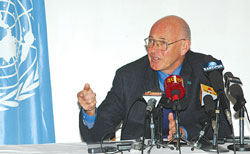|
|
A week after UNMIN chief Ian Martin announced the number of Maoist fighters and weapons registered so far, controversy is still raging. The weapons-to-fighter ratio, which is about 1:9, appears too little. Many analysts have questioned how is it possible that the Maoists have only 3,500 odd weapons when their fighting strength is nearly 32,000? Some experts and politicians are asking whether the ratio be more like 1:1?
This debate, though justified in many ways, misses a few key points about the Maoists. While it is important to account for each and every Maoist fighter and weapon to move the peace process forward, it would be foolhardy to expect that the Maoists will register all weapons in their possession.
No rebel force in the world does that. The level of mistrust between the rebel and government forces is still too high at this early stage of the peace process for the Maoists not to have concealed some of their weapons. And besides, as anyone who followed the conflict over the years should know, the Maoists' main weapons were threats, intimidation, socket bombs and other improvised explosive devices, rather than the antiquated three-nought-threes.
Second, while the number of government weapons lost to Maoist rebels during the conflict and the number of Maoist weapons registered so far by UNMIN do not match exactly, they are tantalisingly close. Little attention has been paid to senior Nepal Army officers who have recently publicly said they are satisfied with the Maoist weapons. They say this because the number comes close to their own figures and also estimates of Maoist weapons by various research and intelligence agencies. There are some weapons which are still missing, of course, but they can be explained: the Maoists too lost some of their weapons, to rebel groups like Jwala Singh and Jai Krishna Goit.
The most important point, however, is that even if these numbers appear low, they were enough to hold the country hostage for ten years. The Nepal Army and police forces could not defeat the Maoists despite having superior firepower. And the Maoists didn't win either. That is why we have this peace process. Focusing on low weapons figures is missing the forest for the trees.
None of this means that the Maoists should be let off the hook lightly. The government, UNMIN, and civil society should keep pressing for a full accounting of all their weapons. But realistically speaking, this will only happen if all sides begin to trust each other. Right now, trust is still tenuous, as was underscored by Martin before he left for New York last week. The UNMIN chief stressed the need for both the government and Maoists to immediately reach agreement on providing security for the Maoist leadership.
That they haven't been able to do so points to the continued mistrust. The Maoists don't trust government security forces to provide them adequate security, and the government doesn't trust the Maoists to carry their own weapons for security purposes. Until this key agreement is reached, the Maoists will have plausible reasons to continue moving around armed, and UNMIN cannot declare that weapons registration and storage is over, and we won't have an interim government, and there won't be a date for constituent assembly elections, etc, etc.




